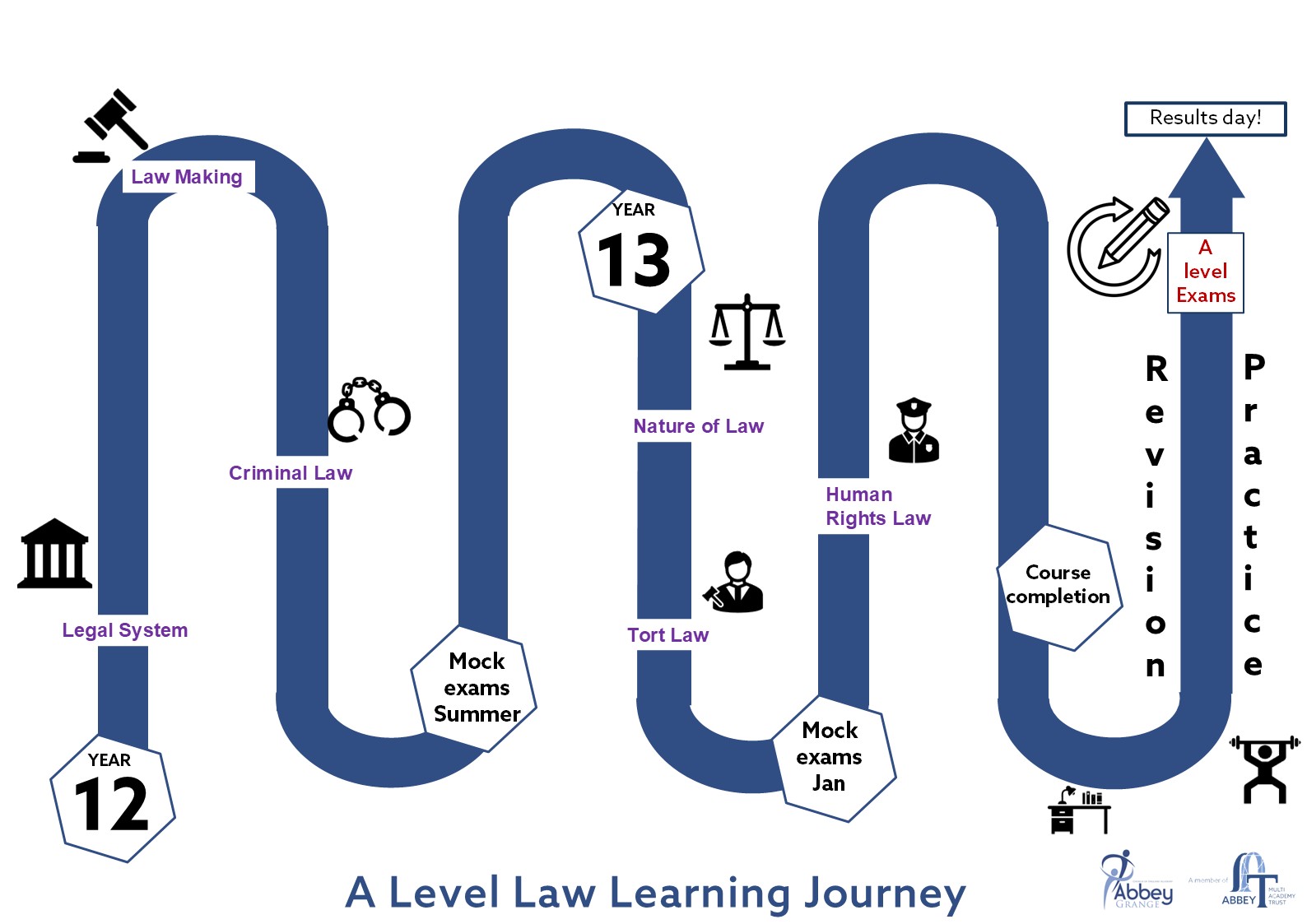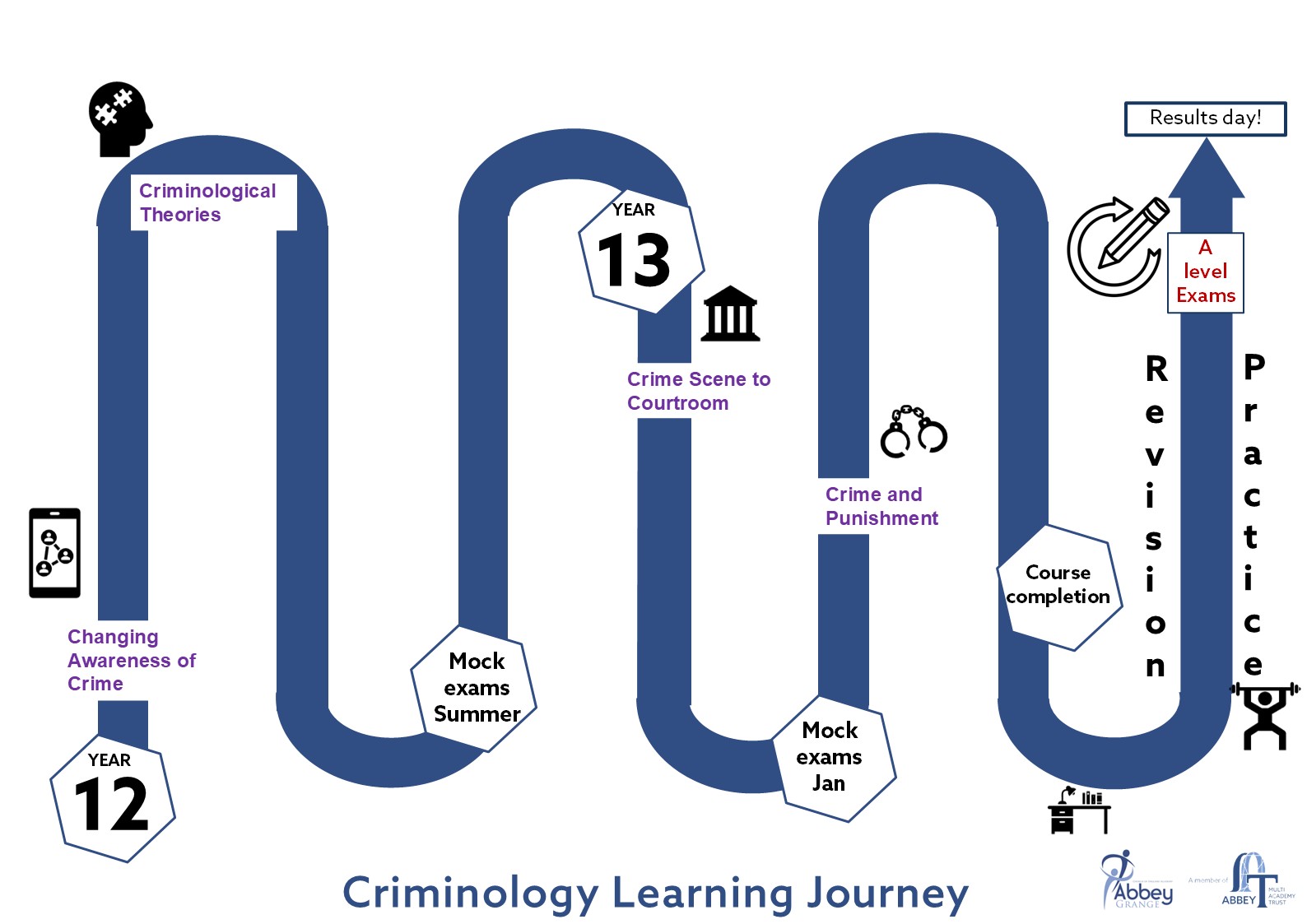
The vision in Law is to encourage students to reflect on their beliefs and sense of justice, fostering moral and spiritual growth rooted in empathy, benevolence, and respect for others. By engaging critically with the law and its role in a diverse, democratic society, they learn to form balanced, principled arguments while resisting prejudice and political pressure. In doing so, students are empowered to advocate for justice and flourish as compassionate, thoughtful citizens who contribute to the common good.
Criminology empowers young leaders to think critically and act justly, grounded in the values of our diverse and inclusive community. Students explore the roots of personal and political beliefs, learning to question media influence, moral panics, and prejudice. Through ethical reflection and a strong moral compass, they are equipped to advocate for justice and flourish in a pluralistic, democratic society.
Head of Department: Mr Hassan Shoket
hshoket@abbeygrangeacademy.co.uk

Students will learn about the legal system, law making, the nature of law, criminal law, tort law and human rights law. Students will learn about civil and criminal courts, the legal professions and access to justice. They will develop knowledge and understanding of the processes and people involved in the law and the changing nature of the legal system. The course also focuses on the rules and general elements of criminal law and introduces criminal liability through the study of fatal and non-fatal offences against the person, offences against property, mental capacity defences, general defences and preliminary offences. Students will apply their legal knowledge to scenario-based situations and gain a critical awareness of the present state of criminal law. In the third topic, students will develop knowledge and understanding of legal method and reasoning as used by lawyers and the judiciary through the study of statutory interpretation and judicial precedent. Students will be introduced to the concept of legal liability through the study of the law of tort, and construct and communicate legal arguments by reference to appropriate legal authorities. They will develop their critical awareness of the law through the study of the nature of law examining the relationship between law and morality, justice and society. The A Level in Law will develop learners’ knowledge of law through advanced study of an additional legal subject human rights law.
The subject inspires ambition by encouraging personal and academic growth by developing complex thinking and analytical skills and helping students envision positive change. Providing real-world contexts through the study of cases develops students’ societal awareness motivating them to pursue legal careers to make a difference in society. The study of Law also strengthens students’ belief in fairness and the rule of law and encourages self-belief through mastering challenging concepts like criminal law and tort law. It also promotes empathy encouraging students to consider how laws protect individuals and the ethical implications of legal decisions. Since the course demands analysis of statutes, case law and legal principles, this pushes students to excel academically supporting intellectual excellence. Finally, Law builds transferable skills such as critical thinking and debating that are key to effective leadership, building confidence in one's voice and opinions.
Law opens up space to reflect on philosophical and spiritual questions- especially when exploring law's relationship with religion, morality, justice, and rights. It helps students to explore who they are in relation to the law- whether they are a subject of the law, or someone with the power to shape it through democratic processes. They will consider their responsibility to obey laws that they disagree with and discuss their personal meaning of justice. Studying law also makes students ask about the duties they have towards others - tort law, criminal law, and human rights law all explore how our actions affect others. Students will also consider questions about where the law comes from, and whether it reflects a higher moral order.
Assessment will take place at the end of the course (after two years of study). It consists of three exam papers covering different areas of the specification, each 2 hours long and each worth 33.3% of the marks. There is a variety of exam questions including essay questions and legal scenario questions. Mock exams will take place in June of year 12 and in January of year 13 that will assess students’ understanding of relevant law, its application and its evaluation.
A Level Law prepares students for the further study of law at university, or related fields such as politics, business and economics. Students wishing to continue their legal studies after A Levels can alternatively opt for a work-based apprenticeship. Both of these routes can lead to the qualifications required to become a solicitor or barrister. Other careers include the police, teaching and the legal executive field. The skills that students develop such as critical analysis, logical thinking, research, and the ability to produce a balanced argument are transferable across many professions.

Students will demonstrate understanding of different types of crime, influences on perceptions of crime and why some crimes are unreported. The way society defines crime and deviance is also explored along with real life campaigns and pressure groups that have affected policy making. In addition, students will examine the reporting of crime in the media to see the impact this has on public perceptions of crime. In the second topic, they will gain an understanding of the social construction of criminality and why people commit crime including sociological, psychological and biological theories of crime and be able to use these explanations to analyse criminal situations. In the third topic, students will learn about the criminal justice system from the moment a crime has been identified to the verdict including the process of evidence. They will develop the understanding and skills needed to examine information for validity in order to review the justice of verdicts in criminal cases. In the final topic, students will apply their understanding of the awareness of criminality, criminological theories and the process of bringing an accused to court in order to evaluate the effectiveness of social control to deliver criminal justice policy.
The Criminology course encourages ambitious thinking by exploring challenging concepts like crime causation, criminal investigations, and crime prevention. It also strengthens belief in fairness, justice, and rehabilitation, helping students understand that positive change is possible within society an through the interpretation of data, evaluation of case studies, and from evidence-based opinions. The subject promotes compassion and empathy by exploring the causes and effects of crime, especially on victims and vulnerable communities encouraging students to think about how to support offenders in rehabilitation and reduce reoffending making a positive difference, whether through youth work or community outreach. The course demands critical thinking and independent learning, encouraging students to interpret complex information and real-life case studies. This supports academic excellence through applied assessment and coursework, helping students produce well-reasoned arguments challenging them to evaluate how the criminal justice system works and to suggest evidence-based improvements. Importantly, Criminology equips students with the knowledge and confidence to lead discussions about crime, justice, and social responsibility in school, speaking up for those affected by crime.
Criminology explores why people commit crime, how individuals respond to it, and how personal choices are shaped by wider influences- this opens up deep reflection on identity and morality prompting students to reflect on personal responsibility, conscience, and whether people can truly change. Studying victims, offenders, and the public, raises powerful ethical questions about how we treat one another and what justice looks like. Importantly, Criminology raises questions about good, evil, punishment, and forgiveness- all of which connect to the idea of a higher moral law.
The course is assessed through two internal examinations (8 hours each) and two external examinations (1.5 hours each) which take place over the two years of study. Each assessment covers one topic of the specification and is worth 25% of the marks. The internal assessments involve completing tasks related to a scenario describing a situation involving various crimes. The external examinations include short and extended answer questions, based on material and applied contexts. The Level 3 Diploma is a single award and equivalent to one A-Level.
An Applied Diploma in Criminology can lead to various career paths, primarily within the criminal justice system such as law enforcement, crime prevention, forensics, prisons and probation, but also in related fields like youth and social work, victim support, and academia. In addition to these direct career paths, a criminology qualification can also provide valuable skills and knowledge for those interested in related fields like sociology, psychology, and law. It can also be a stepping stone to higher education, allowing students to pursue degrees in criminology, criminal justice, and other related fields.